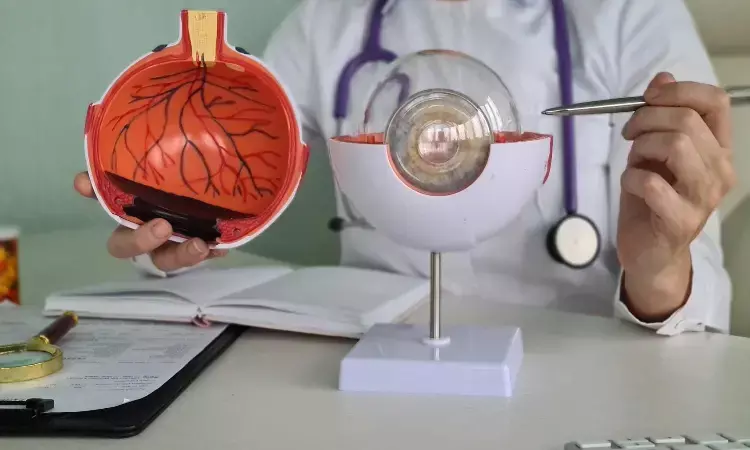- Home
- Medical news & Guidelines
- Anesthesiology
- Cardiology and CTVS
- Critical Care
- Dentistry
- Dermatology
- Diabetes and Endocrinology
- ENT
- Gastroenterology
- Medicine
- Nephrology
- Neurology
- Obstretics-Gynaecology
- Oncology
- Ophthalmology
- Orthopaedics
- Pediatrics-Neonatology
- Psychiatry
- Pulmonology
- Radiology
- Surgery
- Urology
- Laboratory Medicine
- Diet
- Nursing
- Paramedical
- Physiotherapy
- Health news
- Fact Check
- Bone Health Fact Check
- Brain Health Fact Check
- Cancer Related Fact Check
- Child Care Fact Check
- Dental and oral health fact check
- Diabetes and metabolic health fact check
- Diet and Nutrition Fact Check
- Eye and ENT Care Fact Check
- Fitness fact check
- Gut health fact check
- Heart health fact check
- Kidney health fact check
- Medical education fact check
- Men's health fact check
- Respiratory fact check
- Skin and hair care fact check
- Vaccine and Immunization fact check
- Women's health fact check
- AYUSH
- State News
- Andaman and Nicobar Islands
- Andhra Pradesh
- Arunachal Pradesh
- Assam
- Bihar
- Chandigarh
- Chattisgarh
- Dadra and Nagar Haveli
- Daman and Diu
- Delhi
- Goa
- Gujarat
- Haryana
- Himachal Pradesh
- Jammu & Kashmir
- Jharkhand
- Karnataka
- Kerala
- Ladakh
- Lakshadweep
- Madhya Pradesh
- Maharashtra
- Manipur
- Meghalaya
- Mizoram
- Nagaland
- Odisha
- Puducherry
- Punjab
- Rajasthan
- Sikkim
- Tamil Nadu
- Telangana
- Tripura
- Uttar Pradesh
- Uttrakhand
- West Bengal
- Medical Education
- Industry
Anticoagulant and Antiplatelet Use Increases Hemorrhage Risk in Exudative AMD: JAMA

A new study published in the Journal of American Medical Association found that patients with exudative age-related macular degeneration (AMD) using anticoagulants or antiplatelets faced a higher risk of intraocular hemorrhage requiring vitrectomy. Further the risk was greatest with combined therapy, and higher adherence further increased odds of hemorrhage.
The study used data from the Korean Health Insurance Review and Assessment Service and examined records of 1,49,620 patients aged over 40 with exudative AMD from May 2014 to 2023. Of these, nearly 95,000 patients were included in the cohort analysis, while more than 8,000 were assessed in a case-control design. This study aimed to determine whether blood-thinning medications contribute to vision-threatening complications in this already vulnerable group.
Analysis revealed that patients taking either anticoagulants or antiplatelets faced a significantly higher risk of developing intraocular hemorrhage severe enough to require vitrectomy, to remove blood from the eye.
In statistical terms, patients exposed to these drugs had a 15% higher hazard of such bleeding when compared to non-users. Anticoagulant users had an 88% higher likelihood of intraocular hemorrhage and antiplatelet users had a 37% higher risk. The patients taking both anticoagulants and antiplatelets simultaneously faced more than double the risk (128% higher) when compared to the individuals not on such medications.
The study also found individuals with higher adherence to their prescriptions were at greater risk of developing these hemorrhages. This suggests that consistent long-term use, while beneficial for cardiovascular protection, could increase the chance of vision-threatening complications in patients with AMD. AMD is a leading cause of vision loss among older adults worldwide, and exudative AMD in particular is prone to bleeding due to fragile abnormal blood vessels in the retina.
Overall, customized monitoring strategies may be required to balance cardiovascular benefits with ocular safety. This could mean more frequent retinal examinations or a careful reassessment of drug regimens for patients at high risk of eye bleeding. While anticoagulants and antiplatelets remain lifesaving medications for many cardiovascular patients, this research illuminates that their use in individuals with exudative AMD requires special caution.
Source:
Kim, M. S., Nam, S., Lee, J., & Woo, S. J. (2025). Antithrombotic medications and intraocular hemorrhage risk in exudative age-related macular degeneration. JAMA Network Open, 8(9), e2531366. https://doi.org/10.1001/jamanetworkopen.2025.31366
Neuroscience Masters graduate
Jacinthlyn Sylvia, a Neuroscience Master's graduate from Chennai has worked extensively in deciphering the neurobiology of cognition and motor control in aging. She also has spread-out exposure to Neurosurgery from her Bachelor’s. She is currently involved in active Neuro-Oncology research. She is an upcoming neuroscientist with a fiery passion for writing. Her news cover at Medical Dialogues feature recent discoveries and updates from the healthcare and biomedical research fields. She can be reached at editorial@medicaldialogues.in
Dr Kamal Kant Kohli-MBBS, DTCD- a chest specialist with more than 30 years of practice and a flair for writing clinical articles, Dr Kamal Kant Kohli joined Medical Dialogues as a Chief Editor of Medical News. Besides writing articles, as an editor, he proofreads and verifies all the medical content published on Medical Dialogues including those coming from journals, studies,medical conferences,guidelines etc. Email: drkohli@medicaldialogues.in. Contact no. 011-43720751


